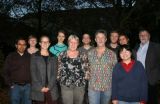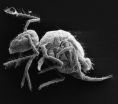(Press-News.org) "In Norway, we almost employ the opposite strategy. The main chunk of resources in special education in Norway is earmarked for secondary schools. We must look more closely at how we can shift and distribute these resources to the primary schools and kindergartens, without automatically removing them from the secondary school classes," says Pål Roland at the Centre for Behavioural Research.
Through "The Challenging Children", a project that aims to reveal, remedy and prevent psychosocial problems among children, aged four to eight years, Roland has seen that teachers and nursery staff are insecure when it comes to the identification of problems and remedial measures.
Difficult to identify children requiring help
Most children, at times, will be angry and act out. This makes it very difficult to identify those children who need extra help and follow-up, says Roland.
He supports the research of Professor Richard Tremblay at the University of Montreal, which reveals that it is normal for children around three years of age to act in a negative manner. The research also points out that the challenging children will show different behavioral patterns.
"They often act negatively and are restless, frustrated and angry. They are not receptive to messages or commands from adults, provide a great deal of resistance and are often excluded when other children play together. This repetitive pattern of behavior, characterized by high frequency and greater severity, should set off the warning bells," says Roland.
The need for increased competence
In Roland's eyes, capacity building is the main key in the effort to help and support children who display challenging behaviour. He points out the need for increased knowledge in, for e.g. developmental psychology, different forms of aggression and behavioural difficulties, exclusion, and last but not least, dealing with the diverse challenges faced by staff in kindergartens and schools.
Increased expertise will provide a better understanding and a different glance at what is happening around children. In addition, with increased skills, people approach the challenges in a different and often better way, remarks Roland.
He believes that boosting competence in kindergartens and schools is essential, but draws also on the need for increased competence among parents.
"The majority focuses on the professionals, but in my view, parents form a very important group. It is the parents that have the greatest influence on their children. Parents should be offered courses, ideally from kindergarten employees with the appropriate expertise and skills."
Positive transitions
The transition from kindergarten to primary school has been a central theme in The Challenging Children project. For many children, the start of school can seem stressful and for challenging children, this stress can translate into negative behaviour. Roland believes that a positive transition helps to create a sense of security for these children. It also gives them the opportunity to tackle the new situation in a positive way.
"Creating positive transitions is an important measure, but we need better procedures in this phase. We must create good systems and these must be in place in all municipalities. This is not just about whether children are ready for school, but equally about whether the systems and apparatus around children are ready and prepared for this transition."
"In the child's last year of kindergarten, those who will receive the child at school can make an effort to visit the child at kindergarten. This will help them to become better acquainted with the child and to foster a good relationship through positive activities together. In this way, the child also becomes well acquainted with the adults, thereby making for a smoother transition. This is a very simple example of how things can be done and it has been proven to work well," says Roland.
He explains that those who will receive the children in school, years prior to kindergarten seek to become acquainted with the child and create good relationships through such positive activities together. In this way, the child is familiar with the adults, and the transition will be easier. "This is a very simple example of how this can be done and it has proven to work well," says the researcher.
In addition, Roland points out that those who will be responsible for children showing serious behavioural problems must have increased competence about the difficulties faced by the child. It is therefore critical that all information about the student, particularly how the kindergarten has worked with the child, must be transferred to the school well in advance of the first school term.
A modest start
National and international research shows conclusively that the effects of measures are much greater when they are introduced at an early stage. In Norway, there is a long way to go to in selling the idea of early intervention to the practitioners.
Roland believes that increased expertise is necessary to identify problems and employ measures. He also believes that an increased knowledge of the various behavioural problems as well as procedural improvements in transitioning from kindergarten to school will provide a good basis for work with early intervention.
"In a complex field, it is fine to start with a few things. If we manage this, then we are on our way," says Roland.
INFORMATION:
Early intervention prevents behavioral problems
2012-11-27
ELSE PRESS RELEASES FROM THIS DATE:
New mechanism for cancer progression discovered by UNC and Harvard researchers
2012-11-27
The protein Ras plays an important role in cellular growth control. Researchers have focused on the protein because mutations in its gene are found in more than 30 percent of all cancers, making it the most prevalent human oncogene.
University of North Carolina Lineberger Comprehensive Cancer Center and Harvard researchers have discovered an alternative mechanism for activating Ras that does not require mutation or hormonal stimulus. In healthy cells, Ras transmits hormone signals into the cell that prompt responses such as cell growth and the development of organs and ...
Being bullied can cause trauma symptoms
2012-11-27
This study of 963 children aged 14 and 15 in Norwegian schools found a high incidence of post-traumatic stress disorder (PTSD) symptoms among bullied pupils. These signs were seen in roughly 33 per cent of respondents who said they had been victims of bullying.
"This is noteworthy, but nevertheless unsurprising," says psychologist Thormod Idsøe from the Universitiy of Stavanger (UiS) and Bergen's Center for Crisis Psychology. "Bullying is defined as long-term physical or mental violence by an individual or group.
"It's directed at a person who's not able to defend themselves ...
Scientists at the Institute of Molecular Biology identify key event for sex determination
2012-11-27
Scientists at the Institute of Molecular Biology (IMB) in Mainz have identified a protein essential for initiating the development of male sex organs. Loss of the gene Gadd45g results in complete sex reversal of male mice, making them appear female. The researchers' finding uncovers a novel signaling cascade, which acts early in development to determine the gonads in males. This discovery sheds light on the genetic network that controls how embryos develop as males or females. The research has just been published in the high-impact journal Developmental Cell.
Research ...
Research reveals new understanding of X chromosome inactivation
2012-11-27
Chapel Hill, NC – In a paper published in the Nov. 21 issue of Cell, a team led by Mauro Calabrese, a postdoctoral fellow at the University of North Carolina in the lab of Terry Magnuson, chair of the department of genetics and member of the UNC Lineberger Comprehensive Cancer Center, broadens the understanding of how cells regulate silencing of the X chromosome in a process known as X-inactivation.
"This is a classic example of a basic research discovery. X-inactivation is a flagship model for understanding how non-coding RNAs orchestrate large-scale control of gene ...
Preventing posttraumatic stress disorder by facing trauma memories
2012-11-27
Philadelphia, PA, November 27, 2012 – Posttraumatic stress disorder (PTSD) is a form of learning that begins at the moment of the exposure to extremely stressful situations and that grows in impact as trauma-related memories are rehearsed and strengthened repeatedly. This somewhat oversimplified view of PTSD yields a powerful prediction: if one could disrupt the rehearsal and strengthening of traumatic memories, a process called reconsolidation of memories, then one might reduce PTSD risk or PTSD severity after potentially traumatic events.
To be certain, it is tricky ...
Enzyme explains angina in diabetics
2012-11-27
In a new study published in the scientific journal Circulation, scientists at Karolinska Institutet and Karolinska University Hospital in Sweden show that an enzyme called arginase might have a key part to play in the development of cardiovascular disease in patients who already have type II diabetes. According to the team, arginase prevents the formation of protective nitrogen oxide in the blood vessels, and treatments that inhibit this enzyme reduce the risk of angina in diabetics.
"The fact that we could demonstrate the presence of arginase in several types of cell ...
New method for diagnosing malaria
2012-11-27
Malaria is a life-threatening disease that strikes more than 200 million people every year – mainly in Africa, Asia and Latin America. The disease is caused by the Plasmodium parasite, which is spread by infected mosquito bites. Today, malaria can be prevented and successfully treated, but more than half a million people nevertheless die every year from the disease.
Large-scale monitoring and treatment programmes during the past decade have reduced the distribution of the disease, and the frequency of actual epidemics has fallen. However, the number of malaria patients ...
A rather thin and long new snake crawls out of one of Earth's biodiversity hotspots
2012-11-27
Field and laboratory work by a group of zoologists led by Omar Torres-Carvajal from Museo de Zoología QCAZ, Pontificia Universidad Católica del Ecuador, has resulted in the discovery of a new species of blunt-headed vine snake from the Chocoan forests in northwestern Ecuador. This region is part of the 274,597 km2 Tumbes-Chocó-Magdalena hotspot that lies west of the Andes. The study was published in the open access journal ZooKeys.
Blunt-headed vine snakes live in an area comprising Mexico and Argentina, and are different from all other New World snakes in having a very ...
Three new arthropod species have been found in the Maestrazgo Caves in Teruel
2012-11-27
A team of scientists from the University of Navarra and the Catalan Association of Biospeleology have discovered three new collembolan species in the Maestrazgo caves in Teruel, Spain. Their description has been published in the Zootaxa journal. These minute animals belong to one of the most ancient animal species on the planet.
The Maestrazgo caves in Teruel are located in a region of the Iberian Range where fauna has not been the subject of much study. It is a very isolated region since its average altitude is between 1,550 m and 2,000 m asl and its climate can be described ...
New test to help heavy drinkers reduce alcohol intake
2012-11-27
Researchers at the University of Liverpool have developed a computer-based test that could help heavy drinkers reduce their alcohol consumption.
Regular heavy drinking can lead to serious health conditions such as liver and heart disease, costing the NHS millions of pounds every year. Research at Liverpool has shown that the habit of consuming alcohol can be interrupted when people practice methods of restraint whenever they see images of alcoholic drinks.
The team developed a computer test that required participants to press particular buttons when an image of alcohol ...




